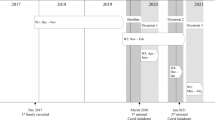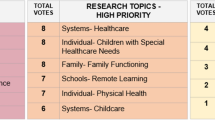Abstract
Relatively few studies have longitudinally investigated how COVID-19 has disrupted the lives and health of youth beyond the first year of the pandemic. This may be because longitudinal researchers face complex challenges in figuring out how to code time, account for changes in COVID-19 spread, and model longitudinal COVID-19-related trajectories across environmental contexts. This manuscript considers each of these three methodological issues by modeling trajectories of COVID-19 disruption in 1080 youth from 12 cultural groups in nine nations between March 2020-July 2022 using multilevel modeling. Our findings suggest that for studies that attempt to examine cross-cultural longitudinal trajectories during COVID-19, starting such trajectories on March 11, 2020, measuring disruption along 6-month time intervals, capturing COVID-19 spread using death rates and the COVID-19 Health and Containment Index scores, and using modeling methods that combine etic and emic approaches are each especially useful. In offering these suggestions, we hope to start methodological dialogues among longitudinal researchers that ultimately result in the proliferation of research on the longitudinal impacts of COVID-19 that the world so badly needs.



Similar content being viewed by others
References
Armstrong, D. (2021). The COVID-19 pandemic and cause of death. Sociology of Health & Illness, 43(7), 1614–1626. https://doi.org/10.1111/1467-9566.13347
Bauer, D. J., & Curran, P. J. (2013). Introduction to multilevel modeling: Course notes. CenterStat.
Betthäuser, B. A., Bach-Mortensen, A. M., & Engzell, P. (2023). A systematic review and meta-analysis of the evidence on learning during the COVID-19 pandemic. Nature Human Behaviour, 7(3), 375–385.
Curran, P. J., & Bauer, D. J. (2013). Latent growth curve modeling: Course notes. CenterStat.
Duong, K. N. C., Le, L. M., Veettil, S. K., Saidoung, P., Wannaadisai, W., Nelson, R. E., Friedrichs, M., Jones, B. E., Pavia, A. T., Jones, M. M., Samore, M. H., & Chaiyakunapruk, N. (2023). Disparities in COVID-19 related outcomes in the United States by race and ethnicity pre-vaccination era: An umbrella review of meta-analyses. Frontiers in Public Health, 11, 1206988. https://doi.org/10.3389/fpubh.2023.1206988
Erkut, S. (2010). Developing multiple language versions of instruments for intercultural research. Child Development Perspectives, 4, 19–24.
Hale, T., Angrist, N., Goldszmidt, R., Kira, B., Petherick, A., Phillips, T., & Tatlow, H. (2021). A global panel database of pandemic policies (Oxford COVID-19 Government Response Tracker). Nature Human Behaviour, 5(4), 529–538.
Hammerstein, S., König, C., Dreisörner, T., & Frey, A. (2021). Effects of COVID-19-related school closures on student achievement-A systematic review. Frontiers in Psychology, 12, 746289.
Harris, M. (1976). History and significance of the emic-etic distinction. Annual Review of Anthropology, 5, 329–350.
Hillis, S. D., Unwin, H. J. T., Chen, Y., Cluver, L., Sherr, L., Goldman, P. S., & Flaxman, S. (2021). Global minimum estimates of children affected by COVID-19-associated orphanhood and deaths of caregivers: A modelling study. The Lancet, 398(10298), 391–402.
Kauhanen, L., Wan Mohd Yunus, W. M. A., Lempinen, L., Peltonen, K., Gyllenberg, D., Mishina, K., & Sourander, A. (2023). A systematic review of the mental health changes of children and young people before and during the COVID-19 pandemic. European Child & Adolescent Psychiatry, 32(6), 995–1013.
Lansford, J. E., Bornstein, M. H., Deater-Deckard, K., Dodge, K. A., Al‐Hassan, S. M., Bacchini, D., & Zelli, A. (2016). How international research on parenting advances understanding of child development. Child Development Perspectives, 10(3), 202–207.
Larsen, L., Schauber, S. K., Holt, T., & Helland, M. S. (2023). Longitudinal Covid-19 effects on child mental health: Vulnerability and age dependent trajectories. Child and Adolescent Psychiatry and Mental Health, 17(1), 104.
Matheiu, E., Ritchie, H., Rodés-Guirao, L., Appel, C., Giattino, C., Hasell, J., Macdonald, B., Dattani, S., Beltekian, D., Ortiz-Ospina, E., & Roser, M. (2023). Coronavirus Pandemic (COVID-19). Our World in Data. https://ourworldindata.org/coronavirus
Park, J. J., Mogg, R., Smith, G. E., Nakimuli-Mpungu, E., Jehan, F., Rayner, C. R., & Mills, E. J. (2021). How COVID-19 has fundamentally changed clinical research in global health. The Lancet Global Health, 9(5), e711–e720.
Penninx, B. W., Benros, M. E., Klein, R. S., & Vinkers, C. H. (2022). How COVID-19 shaped mental health: From infection to pandemic effects. Nature Medicine, 28(10), 2027–2037.
Roser, M., Ortiz-Ospina, E., & Ritchie, H. (2023). Life expectancy. Our World in Data. https://ourworldindata.org/life-expectancy
Rothenberg, W. A., Skinner, A. T., Lansford, J. E., Bacchini, D., Bornstein, M. H., Chang, L., Deater-Deckard, K., Di Giunta, L., Dodge, K. A., Gurdal, S., Junla, D., Liu, Q., Long, Q., Oburu, P., Pastorelli, C., Sorbring, E., Steinberg, L., Tirado, U., Yotanyamaneewong, L. M., Alampay, S., L. P., & Al-Hassan, S. M. (2023). How adolescents’ lives have been disrupted over the course of the COVID-19 pandemic: A longitudinal investigation in 12 cultural groups in 9 nations from March 2020-July 2022. Development and Psychopathology. Advanced online publication.
Skinner, A. T., Godwin, J., Alampay, L. P., Lansford, J. E., Bacchini, D., Bornstein, M. H., & Yotanyamaneewong, S. (2021). Parent–adolescent relationship quality as a moderator of links between COVID-19 disruption and reported changes in mothers’ and young adults’ adjustment in five countries. Developmental Psychology, 57(10), 1648–1666.
United Nations Development Program. (2022). Human development report 2021-22: Uncertain times, unsettled lives: Shaping our future in a transforming world. United Nations Development Program, United Nations. https://hdr.undp.org/content/human-development-report-2021-22
Wolkewitz, M., & Puljak, L. (2020). Methodological challenges of analysing COVID-19 data during the pandemic. BMC Medical Research Methodology, 20(1), 1–4.
World Health Organization (2020a). COVID-19. World Health Organization. https://www.who.int/europe/emergencies/situations/covid-19
World Health Organization (2020b). Estimating mortality from COVID-19. World Health Organization. https://www.who.int/news-room/commentaries/detail/estimating-mortality-from-covid-19
Funding
This research has been funded by the Eunice Kennedy Shriver National Institute of Child Health and Human Development grant RO1-HD054805 and Fogarty International Center grant RO3-TW008141. This research also was supported by National Institute on Drug Abuse (NIDA) grant P30 DA023026.
Author information
Authors and Affiliations
Corresponding author
Ethics declarations
Ethics Approval
This study was approved by the appropriate institutional review boards at universities in each of the participating countries, including the institutional review boards at Duke University, USA, University of Macau, China, Università di Roma “La Sapienza,” Italy, University West, Sweden, Chiang Mai University, Thailand, Chonqing Medical University and Duke Kunshan University, China, Masen University, Kenya, Universidad de San Buenaventura, Colombia, Ateneo de Manila University, Philippines, Hashemite University, Jordan, and University of Naples “Federico II,” Italy. The study was performed in accordance with the ethical standards as laid down in the 1964 Declaration of Helsinki and its later amendments.
Consent to Participate
All study participants provided written consent to participate in this research investigation in accordance with applicable ethical standards.
Conflict of Interest
The authors declare no competing interests.
Additional information
Publisher’s Note
Springer Nature remains neutral with regard to jurisdictional claims in published maps and institutional affiliations.
Supplementary Information
Below is the link to the electronic supplementary material.
ESM 1
(DOCX 27.8 KB)
Rights and permissions
Springer Nature or its licensor (e.g. a society or other partner) holds exclusive rights to this article under a publishing agreement with the author(s) or other rightsholder(s); author self-archiving of the accepted manuscript version of this article is solely governed by the terms of such publishing agreement and applicable law.
About this article
Cite this article
Rothenberg, W.A., Lansford, J.E., Skinner, A.T. et al. Investigating Longitudinal Trajectories of COVID-19 Disruption: Methodological Challenges and Recommendations. Prev Sci (2024). https://doi.org/10.1007/s11121-024-01726-2
Accepted:
Published:
DOI: https://doi.org/10.1007/s11121-024-01726-2




